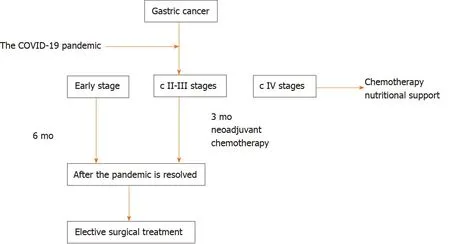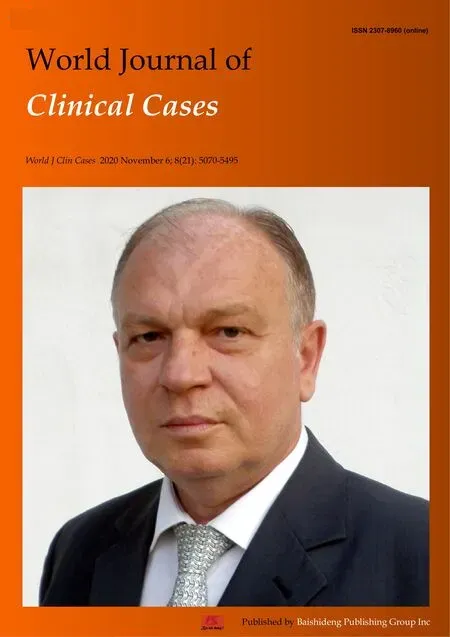Treatment strategies for gastric cancer during the COVID-19 pandemic
Wen-Zhe Kang, Yu-Xin Zhong, Fu-Hai Ma, Hao Liu, Shuai Ma, Yang Li, Hai-Tao Hu, Wei-Kun Li, Yan-Tao Tian
Wen-Zhe Kang, Yu-Xin Zhong, Fu-Hai Ma, Hao Liu, Shuai Ma, Yang Li, Hai-Tao Hu, Wei-Kun Li,Yan-Tao Tian, Department of Pancreatic and Gastric Surgery, National Cancer Center/National Clinical Research Center for Cancer/Cancer Hospital, Chinese Academy of Medical Sciences and Peking Union Medical College, Beijing 100021, China
Abstract The coronavirus disease 2019 pandemic has become a major global public health problem. Governments are taking the necessary steps to reduce the movement of people to contain the spread of the virus. However, these measures have caused considerable distress to patients with gastric cancer who are newly diagnosed or are undergoing treatment. In addition to the cancer, they must deal with longer waiting times for surgery and poor communication with doctors. Furthermore,gastric cancer patients generally have low immunity and a poor nutritional status,so they are a high-risk group for infection with the novel coronavirus. Therefore,it is necessary to formulate reasonable outpatient management strategies to reduce the adverse effects of the pandemic on their treatment. We summarize the management strategies for patients with gastric cancer during the pandemic.
Key Words: COVID-19 pandemic; Gastric cancer; Treatment; Strategies; Management;Outside the hospital
INTRODUCTION
As the pandemic delays the treatment of patients, the treatment of gastric cancer patients during the pandemic faces many challenges. Individualized treatment plans should be developed according to the patient′s tumor progression and available medical resources. As the coronavirus disease 2019 (COVID-19) outbreak has affected the normal functioning of outpatient departments, it is necessary to develop strategies for management outside the hospital. In addition to the treatment of tumors, doctors should pay attention to the nutritional status and mental health of patients. If emergency treatment is unavoidable, all patients should undergo rigorous screening to rule out COVID-19 disease in suspected patients[1].
PROGRESSION RATE AND DISEASE CHARACTERISTICS OF GASTRIC CANCER
As the pandemic delays the treatment of patients, the rate of progression and accurate prognosis of gastric cancer are issues of concern to both doctors and patients.In South Korea, a retrospective study of 101 patients with gastric cancer showed that early stage gastric cancer requires approximately 34 mo to progress from stage I to II. However,from stage III to stage IV, it only needs 1.8 mo. The doubling time of gastric cancer was 11.8 mo at T1 stage and 6.2 mo at T4 stage[2]. According to research by Tsukumaet al[3],the average time for early gastric cancer to develop into advanced gastric cancer is 44 mo. Therefore, a 6 mo waiting period will not affect the survival of patients with early gastric cancer, and for patients at stages II and III, a safe waiting period is within 3 mo[4,5]. Based on the above studies, for most patients with gastric cancer, a delay of several months in surgical treatment is acceptable and does not significantly affect survival outcomes.
Gastric cancer is a chronic wasting disease, usually associated with malnutrition,decreased immunity, anemia, and other conditions[6]. Gastrointestinal symptoms and chronic bleeding associated with gastric tumors can lead to further deterioration of the patient's condition. In addition, malignant tumors result in psychological pressure to patients, and the mental health outlook is not positive. Research results show that 50%of patients with malignant tumors have varying degrees of anxiety, depression, and other mental health problems[7]. The nutritional status, immune status, and the mental health of patients with gastric cancer during the pandemic are worthy of attention.
TREATMENT STRATEGIES FOR GASTRIC CANCER DURING THE COVID-19 PANDEMIC
The treatment of cancer patients during the pandemic faces many challenges. Cancer patients are more susceptible to the novel coronavirus due to their poor immune status. Once infected, the fatality rate is higher[8]. Individualized treatment plans should be developed according to the patient′s tumor progression and available medical resources. However, the strategy and principle of comprehensive treatment based on surgery will not change. As stated before, the progression of early gastric cancer is relatively slow, so the waiting time for surgery can be appropriately extended. After the pandemic is resolved, elective surgical treatment will generally not have adverse effects on the management of these patients (Figure 1).
Patients with locally advanced gastric cancer can choose neoadjuvant chemotherapy initially, then undergo surgery 4 wk after the end of this therapy. The results of relevant studies on neoadjuvant chemotherapy for gastric cancer showed that a waiting time of more than 6 wk before surgery could improve the rate of complete response, while the waiting time had no effect on the prognosis[9,10]. Full use of the multi-disciplinary team model of diagnosis and treatment should be maximally utilized[11], while the doctor-patient network communication platform should be efficiently employed. Patients with high-risk factors, such as poor tumor differentiation and hemorrhagic ulcers, should be closely observed. If disease progression is found, novel coronavirus infection should be quickly excluded, and emergency surgery should be actively performed.
For patients who have completed surgery and are awaiting adjuvant chemotherapy,if they temporarily and unconditionally receive chemotherapy in the hospital, the time of chemotherapy may be postponed, or single-drug oral chemotherapy can be considered. A study of adjuvant chemotherapy for locally advanced gastric cancer found that starting chemotherapy 8 wk after surgery may increase the risk of tumor recurrence and metastasis[12]. Therefore, it is recommended that chemotherapy for gastric and colorectal cancer should be initiated within 6-8 wk after surgery[13].
The progression of advanced gastric cancer is relatively rapid, and drug therapy is the main method of delaying it. Postponement of treatment for 2 wk did not adversely affect the prognosis of patients with advanced gastric cancer[14]. During the pandemic,patients should strengthen their nutrition and continue drug therapy such as chemotherapy, targeted therapy, and immunotherapy.
DEVELOP STRATEGIES FOR MANAGEMENT OUTSIDE THE HOSPITAL
The COVID-19 outbreak has affected the normal functioning of outpatient departments and requires the development of management strategies for patients outside the hospital. Information regarding outpatients should be organized. In addition to data on tumor diagnosis and treatment of patients, contact history, fever history, and other relevant pandemic information should be collected. An effective communication channel recognized by both doctors and patients should be established as well as a special outpatient management team to keep in touch with patients. These systems would ensure that patients can access information and follow-up, even if they cannot go to hospital to seek medical treatment, reducing the unnecessary return of patients to the hospital for treatment.
During the prevention and control of the pandemic, nutritional support is particularly important for patients with digestive tumors. Due to a decrease in digestive function, insufficient nutrient intake, and the negative effects of the tumor on the body, gastric cancer patients have more nutrition-related complications, which affects therapeutic outcomes and increases the risk of tumor-related deaths. For outpatients with moderate to severe nutritional risk before surgery, and patients with postoperative adjuvant chemoradiotherapy, the nutritional risk screening scale for self-assessment should be applied to them. Following the assessment, nutritional support therapy may be recommended for patients with malnutrition, where oral dietary supplements are the best option.
It is necessary to provide psychological assistance to patients during a pandemic[15]as most people are isolated at home and are unable to carry out their next tumor treatment. Most patients will have serious feelings of worry, anxiety, and irritability,which may lead to depression. Delayed treatment or failure to get a review in time may also cause worry and anxiety. Doctors should keep in touch with outpatients,give appropriate advice according to the patient′s condition, dispel their concerns, and give them confidence. It is also advisable to involve a professional psychologist where necessary.
We should also educate patients on how to strengthen their immune system,minimize going out, and if going out is necessary, wear a mask, wash hands, or disinfect often, in order to prevent novel coronavirus infection. In conclusion, effective communication channels should be actively established, management of outpatients should be strengthened, and the advantages of online communication channels should be effectively employed to minimize the impact of the pandemic on tumor treatment.

Figure 1 Treatment strategies. COVID-19: Coronavirus disease 2019.
EMERGENCY RESPONSE AND MANAGEMENT
Patients with gastric cancer may have acute gastrointestinal obstruction or massive bleeding, and these emergencies must be dealt with promptly. We recommend that these patients go to a convenient hospital for emergency treatment as soon as possible.The primary purpose of emergency treatment is to relieve the obstruction or to stop the bleed, relieve the patient′s symptoms, and stabilize the patient′s vital signs, rather than cure the tumor. If emergency surgery is necessary to save the patient's life,laparoscopic surgery should be avoided. All patients should undergo rigorous screening to rule out COVID-19 disease in suspected patients. If the patient is infected with the coronavirus or is suspected to be infected, they should be quarantined immediately and a specialist consultation should be organized. If necessary, transfer to a medical institution capable of treating the novel coronavirus should be organized. At the same time, epidemiological investigations should be conducted to identify the relatives and personnel with whom the patients had contact.
CONCLUSION
The COVID-19 outbreak has affected the treatment of many patients with gastric cancer. We need to adjust traditional treatment strategies to minimize the impact on patients[16]. Due to the novel coronavirus outbreak, patient treatment has been delayed and surgeries postponed. Understanding the progression rate and disease characteristics of gastric cancer can help us adjust treatment strategies. For most patients, a wait of a few months does not have a significant impact on the prognosis. It is particularly important to make full use of the network platform to establish good doctor-patient communication. In addition to the treatment of tumors, doctors should pay attention to the nutritional status and mental health of patients. If emergency treatment is unavoidable, it is necessary to determine whether the patient is infected with the novel coronavirus so that necessary measures can be taken.
 World Journal of Clinical Cases2020年21期
World Journal of Clinical Cases2020年21期
- World Journal of Clinical Cases的其它文章
- Strategies and challenges in the treatment of chronic venous leg ulcers
- Peripheral nerve tumors of the hand: Clinical features, diagnosis,and treatment
- Oncological impact of different distal ureter managements during radical nephroureterectomy for primary upper urinary tract urothelial carcinoma
- Clinical characteristics and survival of patients with normal-sized ovarian carcinoma syndrome: Retrospective analysis of a single institution 10-year experiment
- Assessment of load-sharing thoracolumbar injury: A modified scoring system
- Accuracy of endoscopic ultrasound-guided needle aspiration specimens for molecular diagnosis of non-small-cell lung carcinoma
